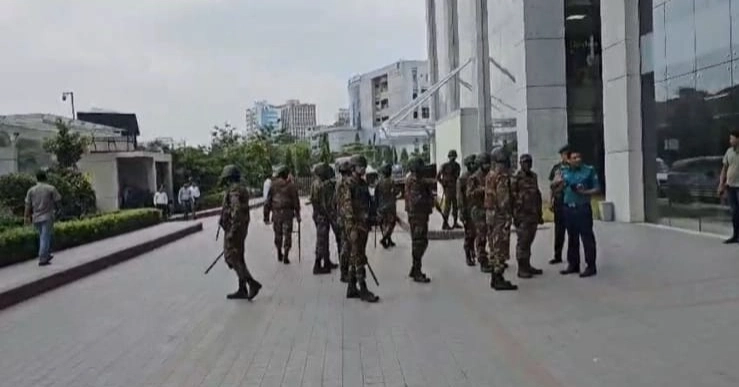Revenue operations across Bangladesh have mostly come to a halt as officials protest the dissolution of the National Board of Revenue (NBR) and press home their four-point demand.
The full-scale strike by officers and employees commenced on Saturday, disrupting tax, customs, and VAT services nationwide, reports UNB.
The protest, led by the NBR Reform Unity Council, follows the interim government’s recent decision to dissolve the board and replace it with two new divisions: The Revenue Policy Division (RPD) and the Revenue Management Division (RMD).
The protesting officials have outlined four primary demands: The immediate repeal of the ordinance that dissolved the NBR, the removal of current NBR Chairman Md Abdur Rahman Khan, the public release of the Revenue Reform Advisory Committee’s recommendations, and the implementation of sustainable revenue reforms through inclusive stakeholder discussions.
In response to the escalating tensions, army and police personnel have been deployed outside the NBR headquarters in Dhaka this morning. Witnesses reported a significant security presence aimed at preventing any potential unrest.
“So far, we have learned from police that forces have been deployed as per the instruction of the home affairs adviser,” an NBR official said.
“Today, the NBR chairman is scheduled to be here as government, semi-government, banks, schools and colleges are open. To avoid an unpleasant situation, the army and police forces have been deployed,” he said.
Previously, the NBR Reform Unity Council had initiated a pen-down strike on May 14, which was temporarily suspended on May 19 following the chief adviser’s proposal for dialogue.
However, with no resolution reached, the council resumed its protest activities, including sit-ins and non-cooperation with the NBR chairman.

The interim government’s decision to restructure the NBR has been met with criticism from various individuals. They argue that the dissolution undermines the autonomy of the administration and could lead to inefficiencies in the state’s revenue collection.
However, Finance Adviser Salehuddin Ahmed maintains that the restructuring is part of broader reforms aimed at enhancing transparency and efficiency in revenue management alongside complying with the recommendations made by the International Monetary Fund (IMF).
Meanwhile, the process of forming an ad hoc committee of the NBR Reform Unity Council, comprising officials and employees from all levels of the customs, VAT and tax divisions of the NBR, has almost been finalised.
As the strike continues, concerns continue to mount due to disruptions in revenue collection which could affect government operations and public services.
The NBR Reform Unity Council has stated that the strike will persist until their demands are met. They have also indicated plans to escalate their protest if the government fails to address their concerns.


